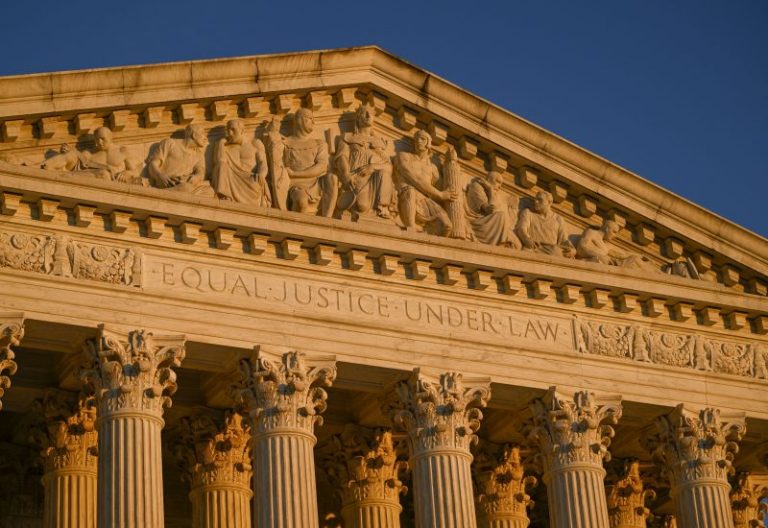The Supreme Court on Friday said it will consider whether to strengthen protections for workers who say their employers fail to accommodate their religious beliefs and practices.
The court will take a new look at how to interpret federal law that requires obliging the religious observance of workers unless doing so would impose an “undue hardship” on the employer. Religious groups say Supreme Court precedent sets too low of a threshold for employers to make the “undue hardship” claim, and conservative justices have been looking for a case that would allow them to review that decades-old decision.
The court’s decision to take the case came as the justices seemed to fill out their docket for the term, which usually runs through June. The court took eight new cases, including one that will have justices return to the question of how to assess whether statements made online are “true threats” that are not protected by the First Amendment.
The religious accommodation case could provide yet another example of how the Roberts court has been overwhelmingly protective of religious rights. Already this term, it has considered whether a designer of wedding websites can tell same-sex couples she will not create sites for them. The website dispute is billed as a free-speech case but was spurred by the designer’s religious beliefs about marriage.
Last term, the court said a school board in Washington state discriminated against a former football coach when it disciplined him for postgame prayers at midfield, and that Maine cannot bar religious schools from receiving public tuition grants extended to other private schools.
The new case concerns Pennsylvania evangelical Christian Gerald Groff, who joined the U.S. Postal Service in 2012 as a Rural Carrier Associate, a non-career job in which he fills in for career employees. His job became a problem when the service entered into an agreement with Amazon to deliver packages on Sundays, when Groff said he observes the Sabbath.
Groff was able to avoid Sunday shifts for years, but resigned in 2019 when it appeared that would no longer be possible. Other workers complained Groff’s refusal to work on Sundays meant more unwanted shifts for them, and one filed a complaint. Groff filed suit after resigning, but lost in federal district court and at the U.S. Court of Appeals for the 3rd Circuit in Philadelphia.
The courts relied on the Supreme Court’s 1977 decision in Trans World Airlines v. Hardison, which found that employers need show only a “more than a de minimis cost,” meaning trivial or inconsequential, to qualify as an “undue hardship.” Religious groups for years have criticized that low threshold, saying almost any inconvenience to the company counts.
Groff’s lawyers reminded the court that federal law was amended in 1972 to “ensure that no worker must make the cruel choice of surrendering their faith or their job.” Their brief added that the court’s subsequent opinion in Hardison “undermines Congress’s efforts to ensure that the Nation remains committed to religious pluralism and the free exercise of religious beliefs.”
Justices Clarence Thomas, Samuel A. Alito Jr. and Neil M. Gorsuch have previously urged their colleagues to reexamine the decision. “Title VII’s right to religious exercise has become the odd man out,” Gorsuch wrote in a previous case the court decided not to take. “Alone among comparable statutorily protected civil rights, an employer may dispense with it nearly at whim.”
Solicitor General Elizabeth B. Prelogar, representing the Postal Service, had advised the court to pass on the case.
Groff “would not be entitled to relief under any plausible standard for ‘undue hardship,’” Prelogar told the justices in a brief.
Groff never had to work on a Sunday, but his supervisor said Groff’s requests for accommodation during the busy holiday season created a “tense atmosphere” among co-workers and led to resentment toward management. Other carriers and the postmaster himself were forced to step in, and a union member filed a grievance alleging he had been forced to cover for Groff in violation of a collective bargaining agreement, Prelogar wrote.
The online threat case, Counterman v. Colorado, focuses on what the government must prove to establish a statement is a “true threat.” Is it enough that a reasonable person would regard the statement as a threat of violence, or must a prosecutor show the speaker knew or intended the statement to be a threat?
The court decided a similar case in 2015, but in a narrow way that several justices have said does not settle the question.
The new case concerns Billy Raymond Counterman, who besieged professional musician Coles Whalen with messages that she found threatening for two years. The musician, who did not know Counterman, never responded and blocked Counterman, but he friended Whalen under other names to continue the messages.
Counterman was convicted under a Colorado law that prohibits making “any form of communication with another person … in a manner that would cause a reasonable person to suffer serious emotional distress.”
He argued at his criminal trial that he was mentally ill and not trying to cause Whalen distress. Prosecutors said Counterman’s mental state was irrelevant and it was enough that a reasonable person would find his comments threatening. A state appeals court agreed.

